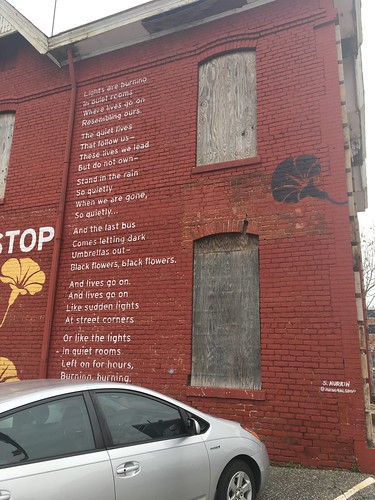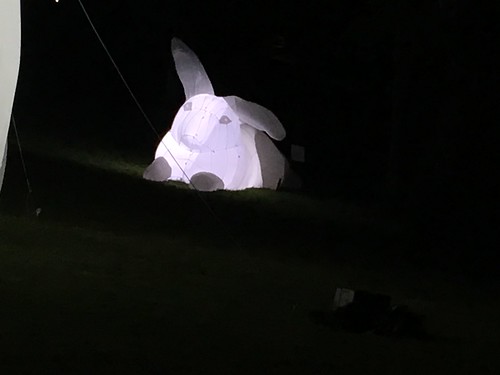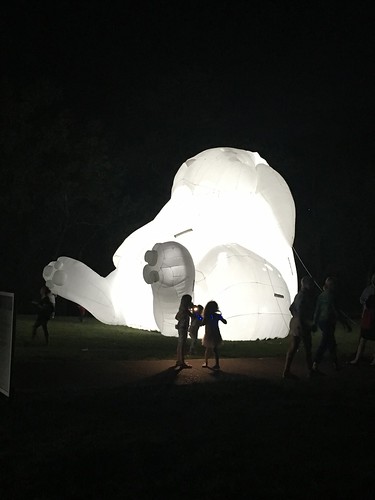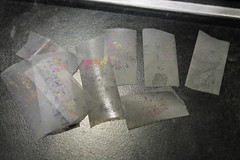Seen in Charlotte, North Carolina, in March:
Poetry
I like big bunnies and I cannot lie
May blitzed by me in a blur of bacteria, bureaucracy, and blackspot. But it also brought Amanda Parer’s BIIIIIIIIG bunnies to a botanical garden in my town:
At Hoppy Hour, there was a silent disco that escaped its blue-lit headphones while I was waiting for my food-truck banh mi and Thai iced tea. It was a fine way to start a Friday night, and so was the spoken word Happening yesterday night at the Frist Art Museum, which included Rashad thaPoet slammin’ the four-dollarcent jury verdict, Debria Love leading a laughter- and snaps-punctuated takeoff on the Lord’s Prayer laden with hip-hop in-jokes after the crowd agreed that Kanye was a Kan-NAY, and S-Wrap (Saran Thompson) pulling the crowd into chants. One refrain:
SW: I speak
Crowd: You speak
All: We speak life!
In the cypher segment, the prompts from the audience included “banana” and some other… oddities … but S-Wrap set up his call-and-response hand cues with “cat,” “power,” “peace,” and “iridescence”:
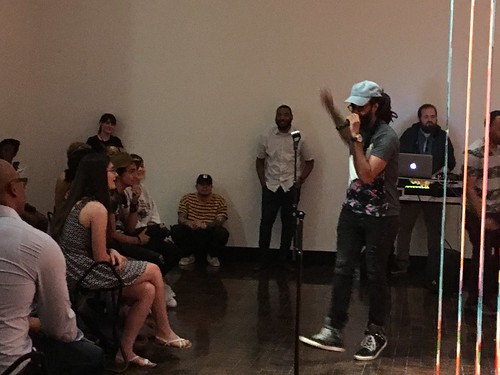
Lunchtime Learning
In case you were occupied with actual lunch yesterday 🙂
I'd like to keep experimenting with cinquains. Which is where you come in 🙂 Send me a small idea (I've only got a few syllables!), a word or a phrase. Once I've got 2, I'll write and post the resulting cinquain. #thetypewriterisopen #socialmediacinquains
— Mary Alexandra Agner (@marywordymary) May 30, 2018
And that's one! 🙂 Who else wants to toss into the cinquain ring? https://t.co/e5JUl1zjVA
— Mary Alexandra Agner (@marywordymary) May 30, 2018
Life
packed up in clouds,
breezed out to bluer
possibles. Unboxing. Everything looks
like scissors.#socialmediacinquains
Thanks to @tshellstudio @cnoocy @aimeekuzenski— Mary Alexandra Agner (@marywordymary) May 30, 2018
Unicorn Removal
When both the glitter and gunk have been scoured away —
tapes and ropes into dumpsters, crumbs and the birds that hoovered them up
long decomposed into daffodil feed — what will we say
to one another, about how we looked before we knew
what it meant to be marked for life, with life,
or will we have learned enough to speak more
about what we are looking at now, however riotous
and unruly and rancid its remains?
[Springboard: temp tattoo (originally on me here) that I ended up (mostly) erasing with tape a few minutes after midnight. What the streaks of pigment on tape really remind me of: smears of frosting. Some other night….]
BINGO!
It’s InterNational Poetry Month and I want to encourage you all to celebrate the poetry in your lives. To that end, I’ve devised a BINGO card for you to keep track of how much poetry you read, read aloud, watch, and revel in. Feel free to forward. Feel free to scratch out the 2018 and change it to 2019 next year and do it all again 🙂
rattles and stares
The subject line is from “Stebbin’s Gulch,” a poem in Mary Oliver’s Blue Horses. I read aloud all the poems in the book to my honorary mama last month, and will be reading “Owl Poem” at her memorial service in June.
(She would’ve grinned at the video at the Owl Poem link, too — especially on the day before Easter.)
She was not a simple woman, and she was so much fun. JR Solonche’s elegy for a “simple” woman at Autumn Sky is also providing pleasure to me this morning. Simplicity contains such multitudes.
The word simple for me is inextricably bound to Kentucky, where I was raised, where an arrangement of “Simple Gifts” was part of my first experience of singing in an SATB chorus, where my dad used to take guests to Shaker Village, and where public school teachers are protesting the legislature’s late-Thursday-night pension shenanigans. The system in my home county (where some of my former classmates are themselves now educators) issued a succinct yet eloquent statement about closing schools yesterday. #APensionIsAPromise
Knott Memories (Bill Knott, 1940-2014)
My first class with Bill Knott consisted of him harranging the students about how difficult writing poetry in form is and how we would all want to drop out and how people just sign up for the class but can’t see it through. I had taken the class specifically because it would be acceptable to write in meter and alliteration and so there was pretty much nothing he could say that was going to make me change my mind. I was so intent on the course material—and proving him wrong—that I can’t tell you how many people dropped the class and didn’t show for the second meeting.
The ironic thing about Bill was that he was an excellent teacher—you just had to weather out the storm. (And sometimes I got very angry about that storm.) Whether you reached the eye or some other calm, I was never sure. But I will never forget the classes where he composed in rhyming iambic pentameter on the spot, writing stuff up on the blackboard and not erasing as he went. He spent hours going over student work in class talking about where stresses fall in English words and how those places are affected by the context and meaning of the sentence.
Another strong memory of Bill is how he acted at readings. Poems were infinitely valuable—you could tell by the way he read them—and he would interrupt himself when a new audience member came in late so that he could hand them printouts of his work. I’m sure in the greater context of the po-biz that might have meant something else but, not being in that whirlwind, all I saw was someone who cared so much about poetry he wanted everyone to have it.
Thomas Lux’s introduction to I Am Flying Into Myself: Selected Poems, 1960-2014 both upholds and expands my viewpoint on Knott. Lux writes (page xxvi) “In my opinion, Knott did not become an exceptional poet because he was an orphan, because of abuse, because of poverty, because of illness, because of any kind of suffering. Everybody suffers. Knott became an exceptional poet despite these things.” He continues (page xxvi) “Knott possessed a wide range of subject matter, a long working life, and a prodigious work ethic.” To show that, Lux tells us (page xxix) “Knott published twelve print books between 1968 and 2004—with small presses, university presses, and major houses.” The Unsubscriber was published by Farrar, Straus, and Giraux, and it still strikes me as amazing how Bill scribbled all over the title page of my copy with his dedication, as if the pen marks were trying to cover over the famous publishing house. Lux closes his introduction by mentioning how Bill met Randall Jarrell’s criteria requirement regarding lightning for being a poet many times over but I appreciate this statement as an attempt to summarize Bill more: (page xxx) “He is one, in a school of one, among the American poets.”
And then, of course, there is re-reading his poems now that he’s gone. Bill’s book The Unsubscriber is one of the few books I have been able to use successfully to interest non-poet non-poetry-reading readers in poetry.
I admire the wordplay, which really ought to be word play so that you see both the “word” and the “play”. Bill wrote in “Step on It”:
Passing the threshold one
does not reach
the threshyoung.
Languagecontains words
which contain words
that contain us
who contain no wordsprior to birthsill—
I admire the pithy in all of Bill’s work. His poem “Flash” is, in its entirety:
Photographs—
lightningbolts which,
their shadows having caught up with them,
perish.
There are too many here, and too many in Lux’s selections—and unlike most contemporary poetry books, with Bill’s work it is A-OK to just open to a page and read the poem—that just lift my head-hairs and beg for a second reading. I’m going to close with another short one, because it seems to say a lot to me, both about people in general and Bill in specific.
WRONG
I wish to be misunderstood;
that is,
to be understood from your perspective.
Alice Walker’s poem “Janie Crawford”
In honor of Women’s History Month, which begins Thurs Mar 1, I am posting Alice Walker’s poem “Janie Crawford” which has always been one of my favorite poems.
Janie Crawford
i love the way Janie Crawford
left her husbands the one who wanted
to change her into a mule
and the other who tried to interest her
in being a queen
a woman unless she submits is neither a mule
nor a queen
though like a mule she may suffer
and like a queen pace
the floor
– Alice Walker
A key element that I look for in any poetry – narrative or otherwise – is accessibility. This does not mean that the best poetry is that which is immediately transparent in all areas, but that the best poetry (to me) is that which offers some kind of immediate access; something – whether beautiful sound, captivating imagery or clear, incisive meaning – that allows me to enter into at least the foyer of the poem’s dwelling or structure. Just as not all buildings are designed and built in exactly the same way, neither are all poems. Because not all poems are built alike, this level of accessibility will vary greatly from poem to poem. Some poems, such as those of Eliot, Bishop, or Moore, are large complex structures – mansions, if you will – containing a seemingly unlimited number of rooms and floors and nooks and crannies. The first time I heard T.S. Eliot’s poem “The Love Song of J. Alfred Prufrock” read aloud (by one of my high school English teachers) I immediately felt the greatness of the poem, felt as if I had entered into the foyer of a large and masterly-built structure. I did not understand the poem – i.e., I would not have been able to explain what the poem meant or was about – but I was enough taken – or taken in – by the poem that I knew I wanted to remain inside it in the hopes of someday touring and understanding the poem in its entirety.
If, in a “mansion” poem, I am moved to look “inward” – to stay inside the poem in order to learn more about the inner workings of the poem, the poem’s architecture in all its rich complexity – then, in a “cottage” poem, I am drawn outward because of the poem’s plainness (with respect to syntax and diction) and immediate accessibility of meaning. When I read “Janie Crawford,” I am struck both by the plain inward “structure” of the poem but also by the outward view that this poem provides me as a reader – a magnificent view into the world of the poem. Not that there is anything magnificent about the subjugation of women but that there is something magnificent (to me) about being able to see so immediately into this world as it is represented in the poem. Of course, just because the language and syntax are plain, doesn’t mean there aren’t structural elements – or furnishings – which I can admire. The space after the first line of the poem is a clever and effective way of setting up readers for something positive – we are given space here to wander off in one direction only to be pulled back immediately with the unexpectedness of the second line. The line breaks also are effective and add interesting meaning to the poem, as with the next line in which the words “the one who wanted” are placed in such a way as to suggest “the one who lacked” in addition to the straight-forward meaning of the one who desired.
Submitted by Lisa Dordal
Dandelion Weeds (Response)
Dandarians, Lee Ann Roripaugh, Milkweed Editions, 2014
I am unsure that I can manage something summarizing or encompassing to say about Lee Ann Roripaugh’s Dandarians because the content is too expansive, too large, and I loved it without managing to be critical about it. So this is a response to, an exhortation to read, if you will, Roripaugh’s book.
There are many bright spots in the book but I think I loved most what the first poem promised me: a discussion of meaning and wordplay at the intersection of multiple languages and cultures, an exploration of Otherness, how history never stops resonating into the present.
The first poem is titled “The Planet of Dandar” and Roripaugh begins it:
Prismed through the scrim of my mother’s Japanese accent, I think dandelions are Dandarians. Dan-dare-ee-uns. Futuristic, alien—like something named after late-night B-movie space creatures from an undiscovered planet.
Maybe this is why the disturbingly lurid fronds seem too yellow to me. They seethe, I believe, with feverishly incandescent radioactivity. I’m convinced this explains the obsessive, anxiety-laced fervor with which my parents uproot them from our lawn. As if under threat of colonization.
The poem moves from here to Bradbury’s Dandelion Wine, to the ramifications of the speaker’s pronunciation of this term at school, to the relationship between speaker and speaker’s mother. In these two verse-paragraphs, my music-ear picks up prism/scrim, seem/seethe/believe, feverish/fervor, feverishly/incandescent, lawn/colonization. Not to diminish the amazing conceit that Roripaugh is building, dandelions as metaphor for colonization, for Otherness, for threat.
Roripaugh continues:
And so when I tell you I’m an alien—a Dandarian, hailing from the planet Dandar—I am, of course, mostly joking. But not entirely. When I tell you I’m radioactive, it’s mostly a posture. But not entirely.
How anaphora makes her point. This verse-paragraph introduces the “you”, which comes back many times throughout the book and changes faces most of those times (but not entirely).
But the remainder of the book is not about the Dandarian, at least not by name. In the poems, the speaker continues to wrestle with language, with love, with lovers, with nature, in amazing ways but not in the same way that the opening poem captivated me. “Senchimental” is another strong example of a poem that discusses language as a metaphor for Otherness and for mother-daughter relationships: “As a child, I weld the words centimeter and sentimental together because my mother pronounces centimeter as senchimental…” The mother counts out centimeters as she knits. That poem closes:
It is, perhaps, no accident, that this is a poem in which the speaker is unsure about whether or not she is running away from something, or running toward it.
One senchimental. Two senchimental. Three senchimental.
I learn how to knit early on. But I do it very rarely.
Understand about needles. Beware the sudden flash and parry, the silvered piercing which leaves a hole that’s sometimes a wound, sometimes an aperture through which we fill ourselves with light. Understand that even the best of us can be skewered, tender pieces of meat that we are, as matter-of-factly as shish kebab.
In addition to the language poems, I loved Roripaugh’s nature pieces. “Antimoaney”, “Dee Aster”, “Thirteen Ways of Looking at the Vermillion River”. But “Skywriting” stands out for me, another example of a poem-long conceit. I too remember those little green caterpillars hanging from invisible strings in the woods behind my childhood home. But to think of them as writing in the sky, like airplanes? Amazing. And Roripaugh goes further:
A star drops out of the sky—sparkling spider dropping down from a shimmering dragline—and you are there to see it.
What I take away from the book as a whole is Roripaugh’s extensive vocabulary, the music within the language, the deep and thoughtful ideas and the juxtaposition of imagery which built those ideas. I had to slow down and think about what I was reading. It was marvelous. I look forward to reading it again.
Calculations
In dangerous times, choosing what to save
becomes both chancier and more deliberate,
a ping-pong of panic vs. preservation.
A milk-splotched sketch. A bicycle bell.
What might be needed for getaways
and what would merely weigh us down
instead of attracting help? Glasses, knives,
a bin full of bulbs we meant to plant last fall—
we used to read about Nazis
as though they were fairy-tale villains—
too long ago and so far out of the pale
to fear with any seriousness, much less flee
but, now being too much of this world,
I parcel out the bulbs: half into the yard,
hoping to be alive in the spring, and allowed
to love the pointless, fruitless flowers,
and half into the pantry, next to the case of water
that’s there just in case. I don’t need the future
to laugh at myself already, for whom am I kidding?
This is a different century, with nowhere to hide
unless you’re so damn rich and white
that laws don’t apply, much less stick. But I
have houses and HQs to clean. Oh, abide
with me, O Thou of bitter herbs and floods
and silence amid sociopaths. Pray I shall
but also pack, and sing but also study,
and sift through what might save me if I store it,
but not set too much store in saving it, or myself.

